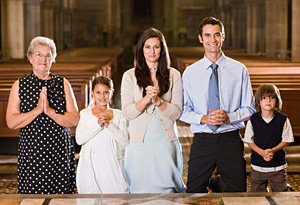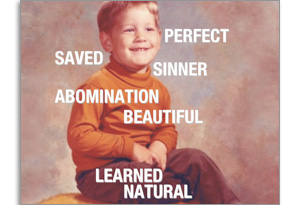Can You Pray Away Being Gay?

Photo: Polka Dot/Thinkstock
When a high school in the South removed a gay student's photo from the yearbook, a big and bold discussion broke out. Across the nation, people are divided when it comes to sexual identity and tolerance. How do your beliefs influence your ability to accept someone who is different than you? Brad Lamm gets to the heart of the question: Can you pray away the gay?
In Jackson, Mississippi, Ceara Sturgis has grown up with her classmates for the past 12 years. Day in day out, she was a well-liked, self-described "tomboy," an academically gifted student to be sure. Yet, when her senior picture and any mention of her went missing from the yearbook, it became clear she'd been removed because of her status as an out lesbian. Big deal? To many, the answer is yes.How would you feel if someone you love told you he or she was gay? How would your view evolve in that moment or over time? Could it change? Why would it change?
"Don't tramp on my rights," my brother Robert recently told me at my nephew Ian's wedding in Oregon. Robert was commenting on gay people who want marriage rights. Somehow, it had become all about him, rather than about them. I asked how letting gays marry would infringe on his rights? "I love the sinner," he said. "The thief, the alcoholic, the adulterer, the homosexual need God's restoration, not our approval." He is a believer that the "gay can be prayed away," and that it is, bottom line, a defect caused by the devil.
This yearbook deletion goes to the heart of the larger issue: how, as a nation, we're split on this notion of sexual identity and tolerance. We are still split as a nation on what we believe, though it's more evenly divided today than ever. It's one part belief, another part feeling.
Gallup released its annual findings on sexuality that tell how we have changed. As of a couple weeks ago, more than 50 percent of Americans now accept gay relationships. What's more, 78 percent of Americans now believe gay Americans should be allowed to serve in the military, while 48 percent believe gay Americans should have the right to marry.
These are the facts. How are the feelings? How does this conversation make you feel?
Brad shares his personal experience of growing up gay

Photo: Courtesy of Brad Lamm
My own parents believed they could cast demons of homosexuality out of people. The joke in my family today is one of the demons slithered out the family room window and came in through my bedroom window while I was sleeping. Truth was, I knew I was gay when I was 4 years old. My mom knew I was gay around the same time, as I was smooching on other boys, yet it caused a commotion and distress when I came out in my late teens just the same, and my parents promptly sent me to a "pray away the gay" therapist.
My brother, who I mentioned earlier, is this kind of therapist.
Every few weeks, I get an email or a call from a family (usually it's a mom who reaches out) asking for my help in doing a "gay intervention" on their kid. Even as the sexual myths have gone the way of flat Earth theories, the way we feel, and the ways we believe sexuality to be, are more often than not based on the biases and beliefs we grew up with.
I was raised being taught white folks (us) shouldn't date or marry a person of another race or even religion. "It's not God's ideal for us," my mother would warn.
It's important to note that in 1968, only 28 percent of Americans supported the legalization of interracial marriage even as Loving vs. Virginia, legalized the very union across the nation that same year. It would take until 1991 until Americans' support for it crossed the 50 percent threshold.
But gay? Is it really all that good? Look, it took me awhile to get used to it being okay, having grown up in a place where what I was, was preached on and spoken of as an abomination. I expected my parents to get hip to the trip really quick, and it wasn't that way. It took years for them to come to some new understanding on gay—and frankly, it's still up in the air what my mom would say if you asked her if gays should marry. It depends on the day.
On the other hand, as we have these hard conversations about who we are and who we believe others to be, it's critical that myths not be counted as fact. A human being comes to grips with his or her sexual orientation, finally comes out to the family and then is furious when the family doesn't get "hip to the trip" right away? It happens. "I'm embarrassed to admit that it took me 27 years to get comfortable with the gay thing, and then I expected my family to find acceptance in a minute," a friend told me recently.
Homosexual creatures are found throughout God's wild and wonderful animal kingdom. It's not unnatural, I think, just not the norm. In Mississippi, the stir was caused by a masculine version of a yearbook photo that said with one look that she was not likely the norm.
When I came out, my mom was devastated. For my whole family, this issue brought them right up against how they felt about what they had been taught. They came face-to-face with a bias created in a vacuum. But what did they know?
Oprah says, "I know what I know." I would ask you, is what you know is informed by flat Earth theology or feelings based on others' prejudices? If the answer is yes, maybe it's time to pull out your own yearbook and see who made you feel uncomfortable and why?
Then, pray on it and come up with your own answer that's loving and kind, no matter where it falls.
Brad Lamm is a board-registered interventionist. He is the author of How to Change Someone You Love. His group offers free training and support groups at BradLamm.com.
Keep Reading:
Why bullying isn't a joke
What women are using—and abusing—to cope with stress
What is sexual anorexia?
My brother, who I mentioned earlier, is this kind of therapist.
Every few weeks, I get an email or a call from a family (usually it's a mom who reaches out) asking for my help in doing a "gay intervention" on their kid. Even as the sexual myths have gone the way of flat Earth theories, the way we feel, and the ways we believe sexuality to be, are more often than not based on the biases and beliefs we grew up with.
I was raised being taught white folks (us) shouldn't date or marry a person of another race or even religion. "It's not God's ideal for us," my mother would warn.
It's important to note that in 1968, only 28 percent of Americans supported the legalization of interracial marriage even as Loving vs. Virginia, legalized the very union across the nation that same year. It would take until 1991 until Americans' support for it crossed the 50 percent threshold.
But gay? Is it really all that good? Look, it took me awhile to get used to it being okay, having grown up in a place where what I was, was preached on and spoken of as an abomination. I expected my parents to get hip to the trip really quick, and it wasn't that way. It took years for them to come to some new understanding on gay—and frankly, it's still up in the air what my mom would say if you asked her if gays should marry. It depends on the day.
On the other hand, as we have these hard conversations about who we are and who we believe others to be, it's critical that myths not be counted as fact. A human being comes to grips with his or her sexual orientation, finally comes out to the family and then is furious when the family doesn't get "hip to the trip" right away? It happens. "I'm embarrassed to admit that it took me 27 years to get comfortable with the gay thing, and then I expected my family to find acceptance in a minute," a friend told me recently.
Homosexual creatures are found throughout God's wild and wonderful animal kingdom. It's not unnatural, I think, just not the norm. In Mississippi, the stir was caused by a masculine version of a yearbook photo that said with one look that she was not likely the norm.
When I came out, my mom was devastated. For my whole family, this issue brought them right up against how they felt about what they had been taught. They came face-to-face with a bias created in a vacuum. But what did they know?
Oprah says, "I know what I know." I would ask you, is what you know is informed by flat Earth theology or feelings based on others' prejudices? If the answer is yes, maybe it's time to pull out your own yearbook and see who made you feel uncomfortable and why?
Then, pray on it and come up with your own answer that's loving and kind, no matter where it falls.
Brad Lamm is a board-registered interventionist. He is the author of How to Change Someone You Love. His group offers free training and support groups at BradLamm.com.
Keep Reading:
Why bullying isn't a joke
What women are using—and abusing—to cope with stress
What is sexual anorexia?
The opinions expressed by Oprah.com contributors are strictly their own.



